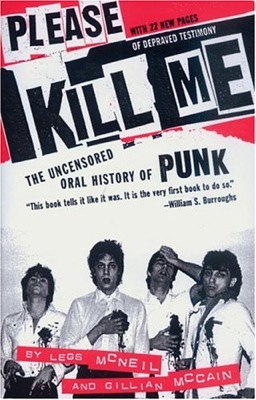

It has been published in 12 languages and helped launch the oral history trend in music books. The 20th anniversary edition features new photos and an afterword by the authors. It is the number one best-selling Punk book of all time. Iggy Pop, Richard Hell, the Ramones, and scores of other punk figures lend their voices to this decisive account of that explosive era. Twenty years later, that book about "junkies and whores" is a classic.About Please Kill Me: The Uncensored Oral History of PunkĪ contemporary classic, Please Kill Me: The Uncensored Oral History of Punk is the definitive oral history of the most nihilistic of all pop movements. At one lunch meeting, McCain recalls, their editor said, "I think there's too much sex in it." At one point, there was some discussion about whether the book would be excerpted in Vanity Fair, but their publisher said, "Legs, it's a book about junkies and whores.are you kidding me?" "I was more confident that people would want to read it," McCain says, "but Legs was like, 'No one's going to read this.'" Happily, McCain was ultimately proved correct-three publishers wanted Please Kill Me.Įven with a publisher lined up, there were challenges along the way.

The authors were passionate about the project but weren't sure how it would be received by publishing houses. "They say you forget the pain of childbirth.well, I don't forget the pain of doing that book." "I still remember how hard it was," says McCain. When the interviews were done and the story was laid out-from Lou Reed's beckoning opening lines ("Come over here so I can talk to you…") to New York Dolls' Jerry Nolan dying in a hospital bed-McCain felt relieved. McCain and McNeil spoke to everyone McNeil could remember from the scene who they could reach.

She developed some tricks: "You've got to wait.because the minute they see the tape recorder, they're kind of freezing up a little." Between her and McNeil, they built up a kind of act: "We had a great 'good cop bad cop' thing-he'd ask someone, 'Who are you fucking?' and then I'd roll my eyes and go, 'He's so disgusting!'" "I never thought of it as interviewing-it was just talking." McCain went into interviews without notes, armed only with a tape recorder. "You know what? I'd never really interviewed anyone before, come to think of it," she says good-naturedly. The two quickly found ways to get their subjects to open up-be they groupies, label dudes, scenesters, or massive stars like Miles Davis, David Bowie, Bob Dylan, and Andy Warhol. With McCain on board, the book shifted from being a history of The Ramones to an account of the punk scene as it spread from Malcolm McLaren's London and the Sex Pistols to New York's CBGB, Television, and Blondie-and far beyond.


 0 kommentar(er)
0 kommentar(er)
